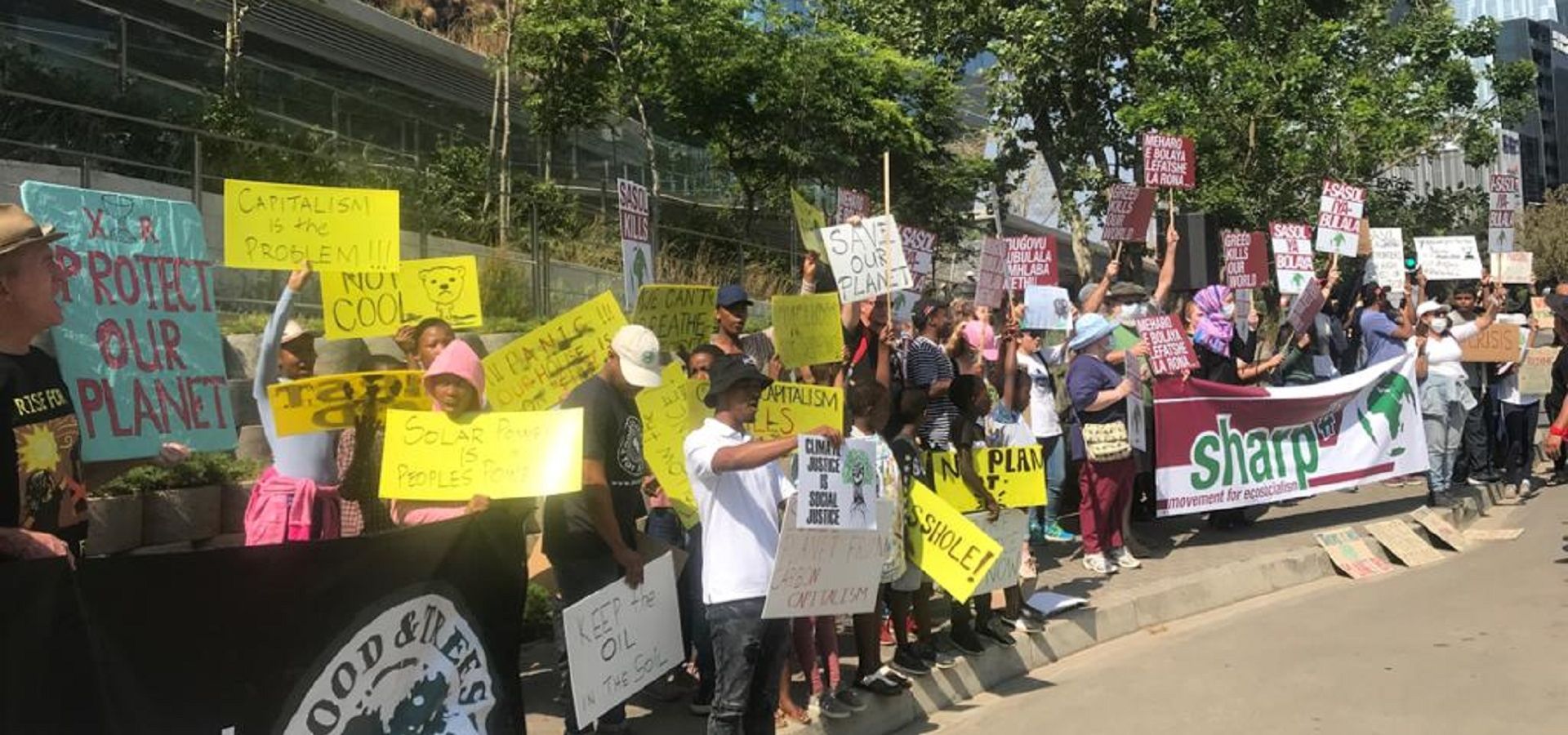Building a climate-resilient South Africa calls for a grassroots drive that addresses the systemic inequality resulting from decades of colonialism and capitalist development. A new Climate Justice Charter has just been unveiled here, which gives a roadmap for how citizens can roll up their sleeves and help bring about a just transition to a post-carbon society. Leonie Joubert reports

Climate activists form a human chain outside SASOL headquarters in Johannesburg, South Africa, in September 2019. Sasol’s coal-to-liquid fuel plant is the largest single-point carbon emitter on the planet. Credit: Vishwas Satgar.
The story of food is a good window into understanding the climate crisis in a country like South Africa. This is not just because of the direct link between food production and extreme weather events, like the devastating years-long drought that has parched the region recently, killing livestock, reducing crop yields and threatening farmers’ livelihoods.
The question of food shows starkly the inherited structural inequality in a country like this, which has one of the biggest divides between rich and poor, following generations of colonial and apartheid rule, and more recent neoliberal economic policies.
Inequality shows up on the dinner plate. Poorer families don’t have the same easy access to healthy, affordable food that middle class households do. Families on a tighter household budget have less money to spend on food, and have to make daily trade-offs about how to use that money: get their children to school; pay for public transport to travel long distances between home and work; buy electricity and mobile phone air time, and so forth.
As the local office of Oxfam pointed out in its Hidden Hunger report in 2014, lower income households have good access to bad food, but bad access to good food. People are often locked into a food system that leaves them dependent on cheap, highly processed foods with little nutritional value, which leads to two forms of ‘hidden hunger’: a shortage of micronutrients that results in stunting and lifelong cognitive slowing; and adult-onset weight gain with a cascade of illnesses such as diabetes and heart disease. All of these illnesses impact on a person’s ability to become educated, earn an income, and have some kind of livelihood.
People born into lower income communities are also likely to have a much lower carbon footprint than wealthier people. Their contribution to the carbon pollution that is driving climate collapse is small, and yet they are disproportionately vulnerable to the impacts of an increasingly unstable climate.
The new Climate Justice Charter, unveiled in South Africa during November last year, is a set of principles that aims to ‘frame a vision that will speak to the climate challenge, while arguing for a deep, just transition to a fair, post-carbon society’, says Witwatersrand University associate professor of international relations Vishwas Satgar.
Satgar is affiliated with the Co-operative and Policy Alternative Centre (COPAC) and the South African Food Sovereignty Campaign (SAFSC), which has spearheaded the Climate Justice Charter.
‘A five-year process of campaigning around high food prices put a spotlight on hunger in South Africa, and connected the dots with the climate crisis,’ explains Satgar.
The Food Sovereignty Campaign started with a series of dialogues within drought-affected communities, but quickly spread to other key sectors in the country: gatekeepers in the news media, faith communities, civil society, and youth and children’s groups.
This process evolved into the Climate Justice Charter, a set of principles that aims to spark a grass-roots movement across the country in response to the climate crisis.
‘The scale of restructuring (to move to a just, post-carbon society) has to happen in work places, in government, in communities, and in the economy. The state can’t solve this problem itself. We need to incite a conception of citizenship, and it needs an approach from below,’ explains Satgar.
The charter lays out the principles needed for active participation by citizens in shaping this process, to drive a democratic planning approach which can create a just transition plan in South Africa.
Where to from here?
In September 2019, the Food Sovereignty Campaign and COPAC joined the global climate strikes by leading a march on the headquarters of one of South Africa’s biggest carbon polluters, SASOL. One of this company’s coal-to-liquid fuel refineries, about 90 minutes’ drive east of Johannesburg, is the largest single-point carbon polluter on the planet.
The protesters were calling for SASOL to produce measurable emissions reduction targets that are in line with the United Nations Intergovernmental Panel on Climate Change’s goal of levelling off global temperature rise at between 1.5C and 2C. They were also asking SASOL to show what its plans are for supporting workers towards a just transition. Workers in the fossil fuel sector and associated industries will be heavily impacted as the economy moves to a lower carbon pathway, and will need support so that they can re-skill in order to move into alternative jobs or livelihoods.
Satgar says that the plan for the charter in 2020 is to continue to draw attention to the big fossil fuel industries in South Africa, and ask for just transition plans from various sectors, while also taking the charter ‘on the road’ so that it can reach wider constituencies.
‘The charter will travel. We will organise community assemblies. We will have a rolling programme of protest actions, starting with SASOL. And we will also target the banks who are financing fossil fuel businesses,’ he says.
This will culminate with handing the charter to the South African Parliament in October 2020, with a demand that ‘government adopt is as per the Constitution’.
‘This is not just about producing a document,’ says Satgar, ‘it’s about the transformative practices that it engenders, so that we can lead a systemic transformation, and create a regenerative society.’
He says that the climate justice movement should aim to be disruptive in three ways: symbolically; it must gridlock carbon; and it must help society exits from the dynamics of uneven capitalist development.